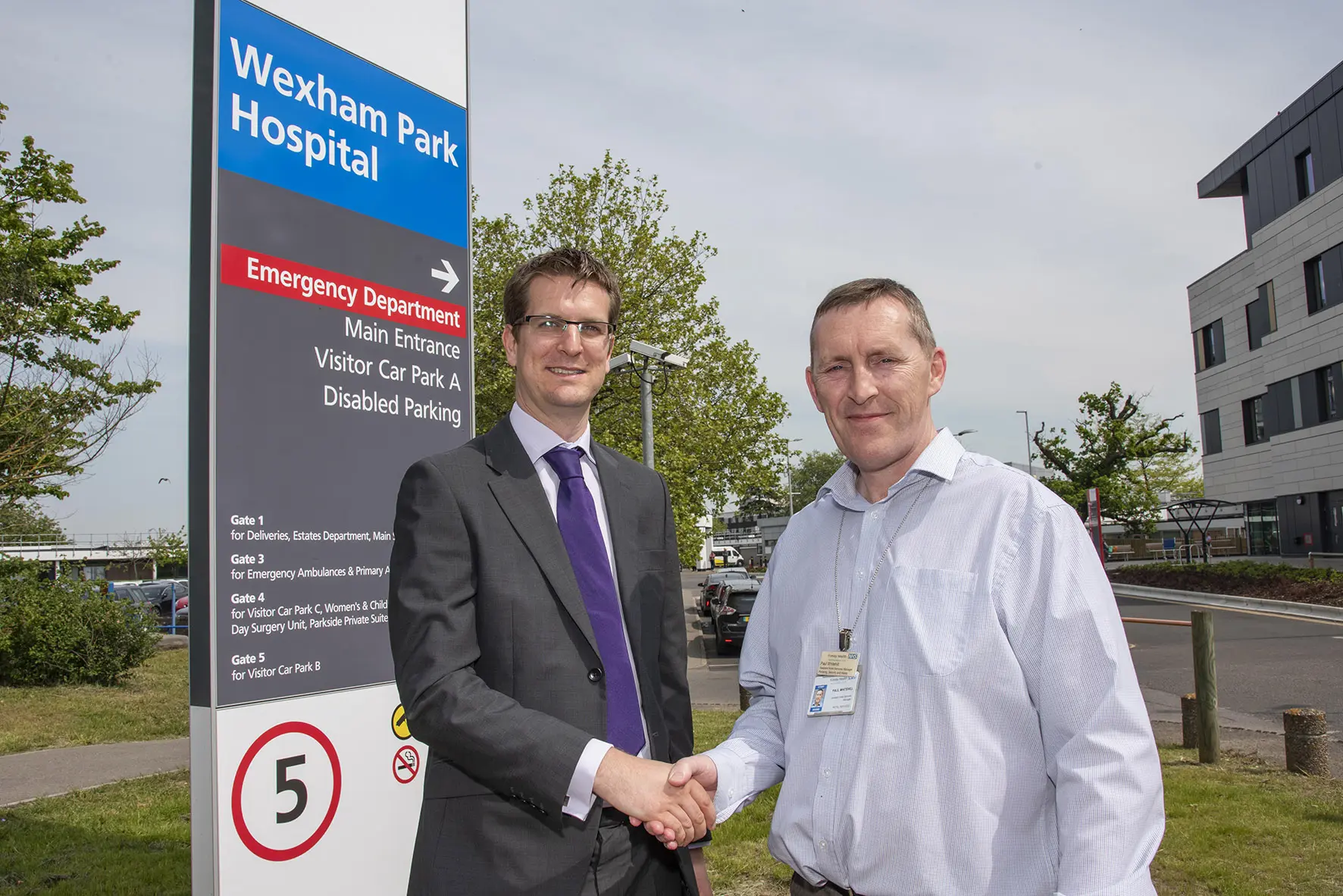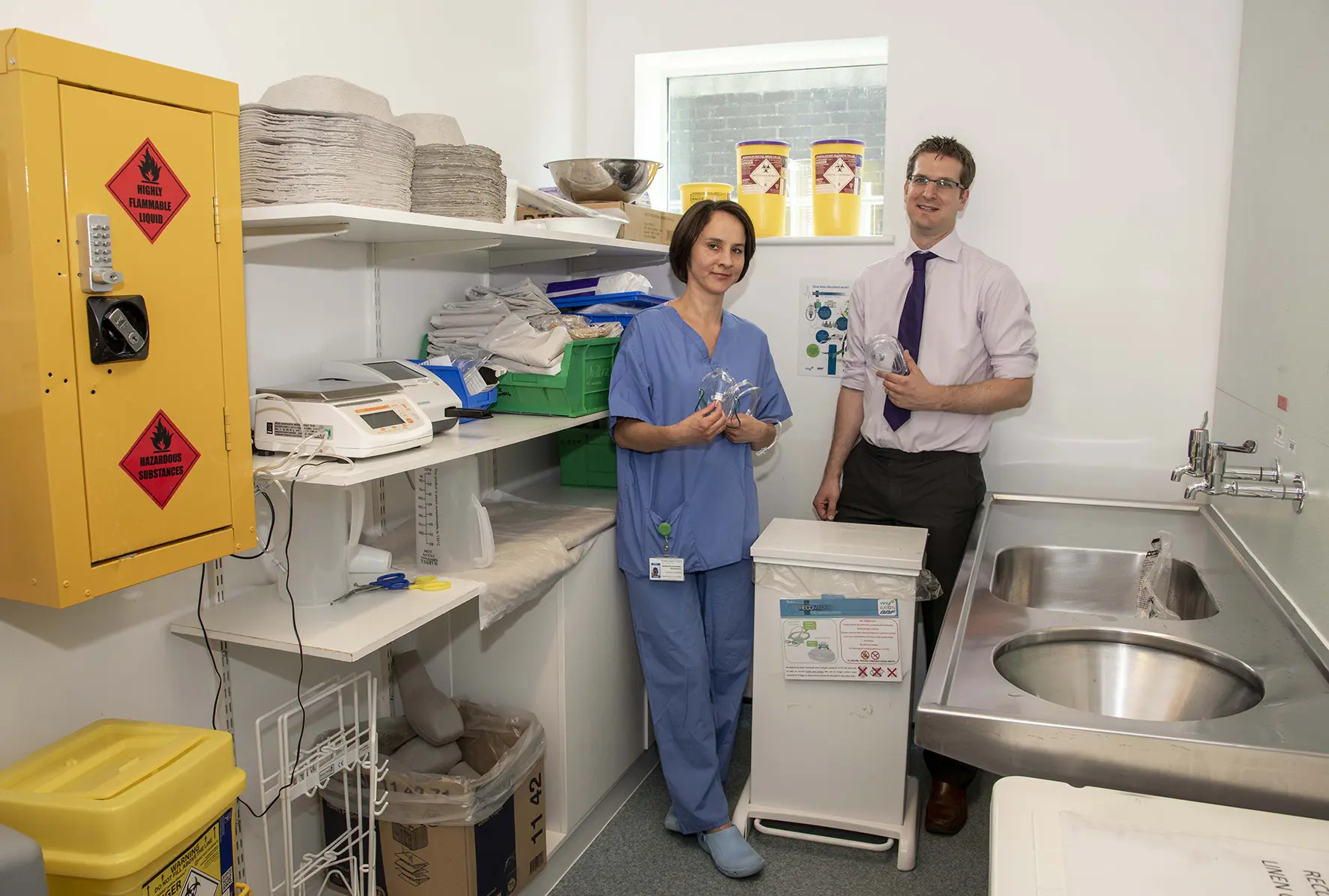A hospital Trust is saving hundreds of pounds a month on waste disposal after implementing a system which separates out clinical waste destined for treatment, from clinical waste for high temperature incineration.
Across its three hospitals, Frimley Health NHS Foundation Trust now segregates infectious waste – all soft clinical waste items from the treatment of known infectious and potentially infectious patients – into orange sacks and sends it to an Alternative Treatment facility instead of for High Temperature Incineration (HTI).
In doing so, it not only achieves cost savings, but also reduces carbon emissions.

At the Trust’s Wexham Park Hospital site alone, waste disposal costs have been reduced by at least £900 a month because Alternative Treatment is just over half the cost of disposal by HTI.
The amount of orange waste being sent for treatment has increased by over five tonnes a month, mirrored by an equivalent drop in the overall amount of waste for incineration (see graph).
The Trust, which includes Frimley Park Hospital near Camberley, Wexham Park Hospital near Slough, and Heatherwood Hospital in Ascot, works closely with Grundon Waste Management, which owns and operates the treatment facilities, to achieve ongoing improvements.
Paul Whitehill, the Trust’s Assistant Hotel Services Manager, who looks after the Wexham Park site, says since Grundon took over the hospital’s waste contract in October 2016, it has made a real difference.
“Our previous waste management supplier incinerated all our waste which was not only expensive, but it also wasn’t good from an environmental point of view,” he says. “Our waste priority now is all about recycling and re-using items and what I like about Grundon is that they give us their full support and help us engage with our employees.
“Becky Lillywhite and James Killick come on site to speak to people with me, we talk to theatre staff, the pathology department and other teams, we hold training sessions and, bit by bit, we have chipped away at things.
“They support our Waste Awareness Days, we walk round the wards together and we seem to be making a difference, our pre-acceptance audits are getting better every year and our recycling statistics are increasing.”
To help streamline segregation, Paul invested in new bins and Grundon has helped provide picture-led signage to make messaging as simple as possible. New double-sided magnetic signs help maximise usage of bins, as the signs can be wiped clean and used on different bins as required.
At Frimley Park Hospital, the introduction of dedicated food waste collections, which sees segregated food waste sent to Anaerobic Digestion facilities for processing into green energy and bio-fertiliser, has removed an average of 12 tonnes of food every month from the general waste collection.
It also brings Frimley Park in line with Wexham Park, where food waste collections were already taking place, making it easier for employees who transfer between the two locations.
The reprocessing of the food waste has been a major contribution to the Trust’s increase in recycling which has doubled over the last year, and it also saves the Trust money as disposing of food waste to AD is cheaper than putting it into general waste.
In addition, there have been fewer vehicle movements for Grundon’s already CarbonNeutral® certified collection fleet, with three fewer compactor collections at Frimley Park Hospital in 2018 compared with 2017.
Also important to Paul are the monthly statistics and reports provided by Grundon which help him see where savings are being made and/or increases in the amount of materials being recycled.
With innovation in mind, he says his team is always looking for new ideas and he is very excited by trials currently taking place around the collection and recycling of empty aluminium anaesthetic gas bottles.
The scheme began just before Christmas and Paul believes it is the first time recycling of the gas bottles has been attempted in the UK. In just two weeks, 7kgs of waste bottles were collected and if successful, it will be rolled out to both Frimley Park and Heatherwood Hospitals.

RecoMed
One success story already been implemented across all three locations is PVC take-back scheme RecoMed, which sees the segregation and collection of single-use PVC items, including plastic tubing and oxygen masks.
These items are usually discarded by hospital staff as patients leave the recovery rooms to return to the ward, but since the scheme began, nearly 700kgs of PVC have been collected and sent for reprocessing.
Around 500kgs of PVC has been collected at Wexham Park Hospital alone and, since August 2018, removing recyclable PVC from the incineration waste stream overall has saved the Trust around £200.
A driving force in helping to promote recycling at Wexham Park is consultant anaesthetist Dr Renata Arszulowicz.
“Overall, I am very passionate about recycling and I also wanted to do more to help reduce clinical waste,” she says. “People were worried and fearful of being fined for non-compliance so they would throw everything into one bin.
“That didn’t make sense, so I spoke to Paul, who introduced me to James at Grundon. He was a great source of information and came up with the answers I needed to start making a difference.
“Talking to the nursing staff about increased segregation I found they were quite receptive and people are now coming up with their own ideas about recycling, which is really encouraging.”
She first heard about PVC recycling when she attended a conference run by the Association of Anaesthetists of Great Britain and Ireland and says: “I came away wanting to do more about recycling and it was agreed that as the RecoMed scheme was already in place in Frimley Park, we could start it at Wexham Park too.
“We have collected almost 500kgs of PVC here so far, and as it requires an effort to dismantle it and segregate the equipment, I am very proud of the difference my nurses are making.
“I’m really excited about the gas bottle recycling and although it is early days, we already know that nursing staff at both Frimley Park and Heatherwood want to adopt it too.”
Increased segregation
Renata has also been working hard to keep non-infectious waste, such as packaging and wraps from medicines, out of infectious waste sacks.
Thanks to her input, smaller general waste bins with black sacks have now been installed in the anaesthetic rooms and the layout has been rearranged to make it easier and quicker for staff to use them instead of the orange ones.
Becky Lillywhite, Contract Manager – Clinical, at Grundon, says a combination of better labelling and signage for bins, as well as posters for wards and departments, and training have all helped to promote better waste management and recycling.
“Holding the Waste Awareness Days and visiting the wards to talk to people has really helped,” she says. “Where we identified waste going into the wrong bins we explained why it was incorrect and organised training to help everyone understand how to get it right.
“People were very keen and I put a lot of that down to the ‘Blue Planet effect’, everyone realises they can do their bit to help with environmental issues. We have given waste awareness training to around 70 housekeepers and porters and had really good feedback, and we’ve also shown the infection control team around our facilities, which they found very useful.
“We also take a partnership approach to compliance and, if bins arrive badly contaminated at our Knowl Hill clinical waste facilities, we take photographs and work with the hospital’s waste team to trace it back to ward level.
“By doing so, we can then provide any further training and help spread the message about correct recycling in the future.”
Always keen to do more, Grundon has been talking to the Trust about introducing a dedicated Paper Cup Recycling service. Thanks to Grundon’s partnership with CupCyclingTM by James Cropper, one of the UK’s leading cup recycling facilities, this enables the recycling of paper cups and for customers to buy back paper made from cups which have already been recycled.
There are also ongoing discussions between Grundon and Trust with a view to Grundon supplying travel/reuseable mugs to eliminate further waste.
In addition, the Grundon team is trying to engage with Trust’s Procurement team to source goods that can be easily recycled, rather than (for example) purchasing non-recyclable items such as polystyrene takeaway containers.
